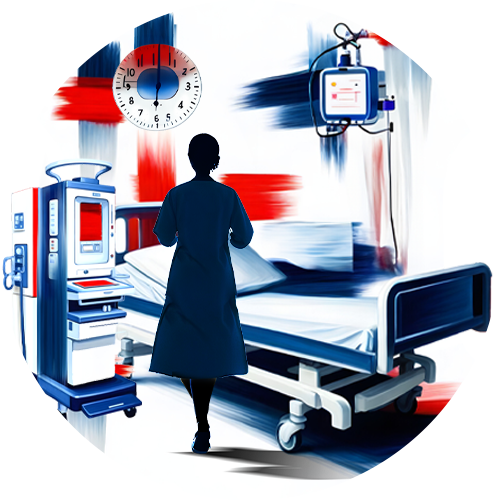On Call — Chapter 8: I Didn’t Know
| May 28, 2024Competent and efficient, Nadia's bedside manner is definitely lacking

As told to Shoshana Gross
“C
ongratulations!” the OB says, smiling. “This is your first, right?” When I nod, she continues, “You must be so excited!” After answering my questions, she tells me, “Please remember to schedule your follow-up visit at the front desk.”
I leave the room, her words replaying in my mind.
You must be so excited.
I am excited. I’ve dreamed of this moment for years.
But I wince as I remember Nadia.
Nadia isn’t tall, but the way she carries herself makes you think she is. Her dark gaze pins you down, and she speaks in an impatient staccato. She’s only a year ahead of me in her residency, but she acts like she’s a doctor with decades of experience. Competent and efficient, her bedside manner is definitely lacking.
Residents, doctors, nurses, techs — I meet so many of them, of all types and stripes, and we try to get along and work together.
Sometimes it’s difficult.
That first week in residency, when I stumbled through the corridors, bumbled through the computer system, and fumbled the placement of my first central venous catheter (the attending had to assist me), Nadia made her feelings clear.
I was trying to figure out how to place an order for a CT scan, when I overheard her hiss venomously, “That new resident, Ayala Rubin, she’s definitely an Orthodox Jew. I can tell she’s wearing a wig, and I know the type. Looks young, too. The way these Orthodox Jews are, she’ll be having a baby soon and messing up our schedule.”
I didn’t hear the other resident’s reply. It was with a kind of frozen horror that I sat, staring blankly at my screen. To be fair, residency might be the only job in the world where you schedule your life a year in advance; The Schedule cannot be changed by any last-minute whim. A pregnancy and subsequent (far too short) maternity leave can ruin people’s plans, causing them to work more hours. But this comment felt so targeted that it shook me.
As the weeks of residency passed, I became more sensitive to the vibes and unspoken words of the other medical personnel. To their credit, most of my colleagues were sincerely friendly and helpful — but there was plenty of subtle anti-Semitism aside from that of the openly hostile Nadia.
“Why do you/why can’t you…?” someone would begin. It’s the tone that makes the music, and sometimes the tone was genuine, sometimes accusatory.
And if the other person had the free time (which wasn’t often) to start spouting politics, I would pretend to be rushing to an urgent case. The less discussion about Israel, the better. Did they think the Prime Minister consulted me?
Now, at the beginning of my second year of residency, as I schedule my next OB appointment around ridiculously long shifts, I remember Nadia’s comment, and I know the difficult journey is only beginning.
I didn’t realize the nausea.
It hits me like a tsunami, crushing my appetite into nothingness and leaving me with an endless pit of misery in my stomach where once, long ago, I used to have a stomach.
“I made chicken soup!” Yaakov says proudly. “Your mother walked me through the steps. Guaranteed to make you feel better!” His only response is the echo of footsteps as I dash to the nearest bathroom.
The nausea accompanies me to the ER as my scalpel incises the red, swollen abscess on a young woman’s back. I clench my teeth and bile burns my throat as I break up pockets of matter and let the pus drain. The procedure finished, I rush to the bathroom, retching. Again.
I didn’t know about the pain.
I’m on my feet for shifts that can stretch hours at a time. I dash from room to room, from patient to patient, talking, diagnosing, prescribing, discharging. And then there are emergencies, where we race to the trauma bay to deal with whatever situation has come up. My sneakers are comfortable, but nothing can cushion my feet from such abuse. At home, I sprawl on the couch, my throbbing digits immersed in hot water, fantasizing about a job as a pilot (they don’t walk much, do they?).
I didn’t know about the fatigue.
I’ve pulled all-nighters as a med student and survived endless rounds of being on call, but this is a whole new level. Some days, it’s all I can do to put one foot in front of the other. I swim slowly through the air, my eyelids heavy, thoughts hazy and gray. Every muscle is crying for a bed, or something horizontal to lie down on. Even the hard, white ER floor looks inviting — but I can’t give in. I need to prove that having a child is not going to ruin everyone’s Schedule, nor make me unable to do my fair share of work.
I definitely didn’t know about the comments.
Starting a family in the middle of residency is akin to sprouting wings and a horn. Not a common occurrence.
“You’re so young,” a nurse says, shaking her head.
“Do you think it’s wise?” asks a colleague.
“I see you’re having a baby!” chuckles (yet another) patient disbelievingly. “How are you managing?”
Just. Fine.
And remembering Nadia, I know that some of my colleagues are upset.
It’s late at night, the inky blackness outside contrasting with the blinding whiteness of the ER, and there are no new patients on my schedule at the moment. I head for the residents’ lounge and sink into the tattered, blue couch. It’s not much: a few chairs, a table, a microwave, and a coffee machine, but it’s a place to sit down and think. It’s been a long, hard shift, and even though I’m exhausted, I only have ten minutes. How am I going to make it through this pregnancy?
I didn’t know how “other” I would sometimes feel, here in the ER, surrounded by colleagues who will never fully understand who I am and what I stand for. It’s the “otherness” of being a woman starting a family at this point in time, the “otherness” of being Jewish and different. Sometimes that knowledge is only an undercurrent, but these days it’s becoming a tidal wave. I’m alone.
And then I feel the gentlest flutter, like a butterfly wing swooping inside, the soft, swift movement of something… can it be? Is this what new life feels like, this stirring of hope?
I feel it again, and I smile.
I am “other,” and I wouldn’t have it any other way.
The characters in this series are composites; all the stories are true.
(Originally featured in Family First, Issue 895)
Oops! We could not locate your form.


